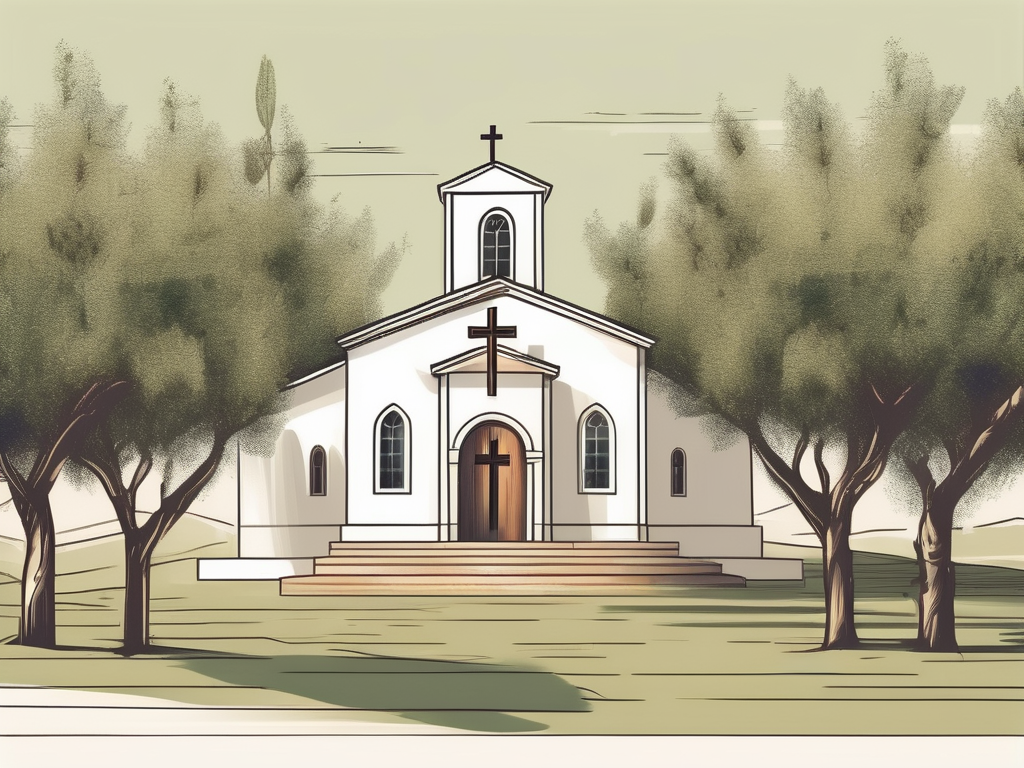Disciples of Christ is a religious denomination that emerged in the early 19th century. This article aims to provide a comprehensive understanding of their beliefs, covering their historical background, core beliefs, practices and rituals, community involvement, as well as addressing some controversies and common misconceptions.
Historical Background of Disciples of Christ
Disciples of Christ has its roots in the Restoration Movement, which sought to unite Christians by restoring the practices and beliefs of the early church. The movement began in the early 1800s in the United States, with the goal of promoting unity and breaking free from denominational divisions.
The early years of the Restoration Movement were marked by a deep sense of optimism and a desire to return to the simplicity and purity of the early Christian church. Leaders such as Alexander Campbell and Barton W. Stone played significant roles in shaping the beliefs and practices of the movement. They believed that by stripping away the man-made traditions and doctrines that had accumulated over the centuries, they could rediscover the true essence of Christianity.
Founding Principles and Early Beliefs
The early followers of Disciples of Christ believed in the autonomy of local congregations, the priesthood of all believers, and the authority of Scripture. They emphasized the importance of personal faith and the simplicity of Christian practice, rejecting complex creeds and rituals.
One of the central principles of the movement was the idea that Christians should be able to find common ground in the essentials of the faith, while allowing for diversity in non-essential matters. This principle of unity in diversity was a key driving force behind the formation of the Disciples of Christ.
Evolution of Beliefs Over Time
As the movement grew, some doctrinal differences emerged among its members. Over time, specific theological positions on baptism, communion, and the role of Jesus Christ became more defined within the Disciples of Christ community. Yet, the movement has also maintained a degree of theological diversity and encourages open dialogue and interpretation.
One of the significant developments in the history of Disciples of Christ was the emergence of the “Campbell-Stone” movement, which brought together the followers of Alexander Campbell and Barton W. Stone. This union helped solidify the movement and establish a more unified identity.
Throughout its history, Disciples of Christ has been involved in various social and humanitarian causes. The movement has been active in promoting education, advocating for the abolition of slavery, and working towards racial reconciliation. These social justice efforts have been rooted in the belief that Christians are called to actively engage with the world and work towards the betterment of society.
Today, Disciples of Christ continues to be a diverse and dynamic movement, with congregations spread across the United States and around the world. While the movement has evolved and adapted to the changing times, its core values of unity, simplicity, and the priesthood of all believers remain central to its identity.
Core Beliefs of Disciples of Christ
At the core of Disciples of Christ’s beliefs is the centrality of Jesus Christ in the Christian faith. They affirm Jesus’ identity as the Son of God and Savior of humanity.
The Role of Jesus Christ
Disciples of Christ believe that Jesus Christ is the foundation of Christian faith and the ultimate authority in matters of doctrine and practice. They strive to follow Jesus’ teachings and example, as revealed in the Gospels.
Jesus Christ, as the Son of God, holds a unique and central position in the belief system of Disciples of Christ. They view him not only as a historical figure but also as a divine being who offers salvation to all of humanity. The teachings of Jesus, as recorded in the Gospels, serve as a guide for their moral and ethical conduct.
Disciples of Christ seek to emulate Jesus’ compassion, love, and selflessness in their daily lives. They believe that by following his example, they can better understand and fulfill their purpose as Christians.
The Importance of Communion
Communion, also known as the Lord’s Supper, holds significant importance in the worship practices of Disciples of Christ. They believe that through the sharing of bread and wine, they participate in the body and blood of Christ, symbolizing their spiritual connection to Jesus and fellow believers.
During the communion service, Disciples of Christ reflect on the sacrificial death of Jesus and the redemption it offers. They see it as a time of remembrance and thanksgiving for the ultimate act of love and grace that Jesus demonstrated through his crucifixion.
Partaking in communion is not only a personal act of devotion but also a communal experience. It serves as a reminder of the unity and fellowship shared among believers, as they come together to remember and honor Jesus’ sacrifice.
The Concept of Baptism
Baptism is another essential element of the Disciples of Christ faith. They practice baptism by immersion, viewing it as a public declaration of one’s faith and entrance into the community of believers. Baptism is seen as a response to Jesus’ call to be born again and to follow him.
Disciples of Christ believe that baptism represents a spiritual rebirth and a commitment to a life of discipleship. Through immersion in water, they symbolize the cleansing of sin and the beginning of a new life in Christ.
Baptism is not only an individual act but also a communal event. It signifies the individual’s acceptance into the community of believers and their commitment to live out the teachings of Jesus in fellowship with others.
Disciples of Christ emphasize the importance of baptism as a transformative experience that marks the beginning of a lifelong journey of faith. It is a public declaration of one’s commitment to follow Jesus and a visible sign of their identity as a disciple.
Practices and Rituals of Disciples of Christ
Disciples of Christ engage in various practices and rituals as part of their worship and spiritual growth. These practices and rituals are deeply rooted in the teachings of Jesus Christ and are meant to strengthen the bond between the individual and God.
Worship Services and Sermons
Worship services in the Disciples of Christ tradition are a time of communal gathering and spiritual reflection. These services typically revolve around the reading and interpretation of Scripture, prayer, and congregational singing. The congregation comes together to praise and worship God, seeking guidance and inspiration for their daily lives. The sermons delivered during these services play a significant role, providing spiritual guidance and addressing relevant issues that the community may be facing. The ministers, who are trained in theology and biblical studies, deliver these sermons with the aim of deepening the understanding and faith of the congregation.
During worship services, the Disciples of Christ also engage in various rituals and practices that enhance their spiritual experience. These may include the lighting of candles as a symbol of God’s presence, the offering of prayers for the well-being of the community, and the sharing of personal testimonies to inspire and encourage one another.
Sacraments and Ceremonies
In addition to baptism and communion, which are considered central sacraments in the Disciples of Christ tradition, there are other significant sacraments and ceremonies that hold great importance for the community. These sacraments and ceremonies are seen as sacred moments that connect individuals to the divine and mark important milestones in their spiritual journey.
Weddings, for example, are considered a sacred union between two individuals, blessed by God and witnessed by the community. The ceremony is a celebration of love, commitment, and the joining of two lives in the presence of God.
Funerals, on the other hand, are a time of mourning and remembrance. They provide an opportunity for the community to come together to support and comfort one another in times of loss. The funeral service is a solemn ritual that honors the life of the deceased and offers prayers for their eternal peace and the comfort of their loved ones.
The anointing of the sick is another significant sacrament in the Disciples of Christ tradition. It is a ritual of healing and spiritual support for those who are facing illness or physical challenges. Through the anointing of oil and the laying on of hands, the community seeks to bring comfort, strength, and the presence of God to those in need.
The dedication of infants is a joyful ceremony that celebrates the birth of a child and welcomes them into the community of faith. It is a time of prayer and blessing, where the parents and the congregation commit to raising the child in the teachings of Jesus Christ.
These sacraments and ceremonies, along with the regular practices of worship and sermons, form an integral part of the spiritual journey of Disciples of Christ. They provide opportunities for individuals to deepen their relationship with God, seek guidance and support from the community, and find solace and inspiration in times of joy and sorrow.
The Disciples of Christ Community
The Disciples of Christ community is actively involved in various aspects of the wider society. With a strong emphasis on community engagement, the Disciples of Christ strive to make a positive impact on the world around them.
One of the key roles of the Disciples of Christ is to address social issues and advocate for justice. They firmly believe in the importance of standing up for the marginalized and oppressed, working towards a more equitable society. Through their involvement in various social justice initiatives, the Disciples of Christ actively promote equality and fight against systemic injustices.
In addition to their advocacy work, the Disciples of Christ also provide support to those in need. They understand the importance of reaching out to the vulnerable members of society and offering a helping hand. Whether it’s through community outreach programs, food drives, or providing shelter for the homeless, the Disciples of Christ are committed to making a difference in the lives of others.
The Role of the Church in the Community
Disciples of Christ understand that the church plays a vital role in the community. They believe that the church should be a place of refuge, where individuals can find solace, support, and guidance. The church serves as a spiritual home for its members, providing a sense of belonging and a community of like-minded individuals.
Furthermore, the Disciples of Christ recognize that the church is not just a physical building, but a living and breathing entity that extends beyond its walls. They actively encourage their members to go out into the community and be a positive force for change. Whether it’s volunteering at local charities, participating in community events, or simply being a listening ear to those in need, the Disciples of Christ strive to make a lasting impact on the lives of those around them.
The Global Presence of Disciples of Christ
While the Disciples of Christ denomination has its roots in the United States, it has expanded its reach to various parts of the world. The global presence of Disciples of Christ allows for cultural and theological exchange, enriching the understanding of what it means to be a follower of Christ.
Through their international partnerships and collaborations, the Disciples of Christ have been able to learn from different cultures and traditions, broadening their perspective on spirituality and faith. This global presence also enables them to support and uplift communities in different parts of the world, providing aid and resources to those in need.
Furthermore, the global presence of Disciples of Christ fosters a sense of unity among believers across borders. It allows for the sharing of ideas, experiences, and best practices, creating a global network of support and encouragement. This interconnectedness strengthens the Disciples of Christ community and reinforces their commitment to spreading the message of love, compassion, and justice.
Controversies and Misconceptions
As with any religious group, Disciples of Christ have faced controversies and have been subject to misconceptions.
Addressing Common Misunderstandings
One common misconception is that Disciples of Christ are solely focused on unity and disregard doctrinal differences. While they value unity, they also recognize the importance of theological discussions and engaging with diversity of thought. These discussions help shape the evolving understanding of faith within the community.
Debates Within the Disciples of Christ Community
Disciples of Christ, like any religious community, have ongoing debates on various theological and ethical issues. While they strive for unity, differing perspectives on social issues, scriptural interpretation, and doctrine continue to be topics of discussion. This internal dialogue reflects the diversity and evolving nature of the Disciples of Christ community.
In conclusion, understanding the beliefs of Disciples of Christ requires an exploration of their historical background, core beliefs, practices and rituals, community involvement, as well as addressing common controversies and misconceptions. Disciples of Christ’s emphasis on Jesus Christ as the foundation of their faith, their engagement in worship practices, and their commitment to social justice are among the key characteristics that shape their identity as a religious denomination.












